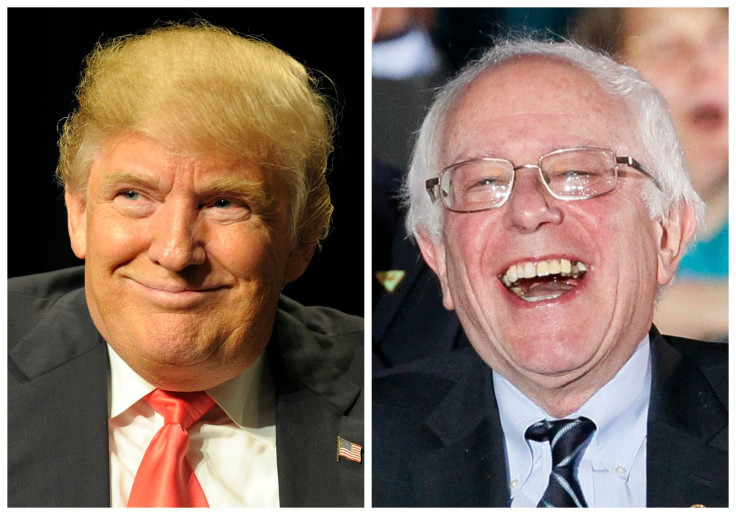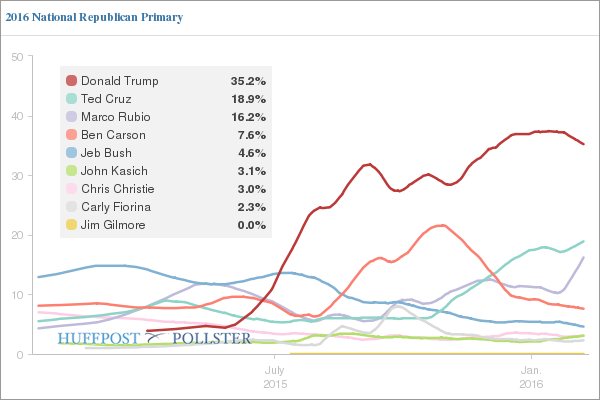
The results of the New Hampshire primary are in , with fringe candidates making big wins in the granite state: Donald Trump led the broad GOP field with 35 percent, while Bernie Sanders beat his only competitor, Hillary Clinton, with 60 percent of Democratic primary voters. Winners gained a few delegates that will support them at their parties’ conventions this summer. The also showed that they are competitive, an important benchmark for donors and undecided voters as the campaign intensifies and the number of candidates drops.
Second, third and fourth place were particularly important in the Republican race. Ohio Gov. John Kasich surged into second (15 percent) and Ted Cruz (12 percent). Former Florida Gov. Jeb Bush and Florida Sen. Marco Rubio placed in a virtual tie for fourth place (11 percent).
What does the results mean, and why does New Hampshire matter? It’s a long way to the White House, but here are the top 5 takeaways.
1) Trump’s Poll Numbers Mean Something
Donald Trump has led Republicans in the polls by 10-20 points since he first announced his campaign in July. New Hampshire squashes theories that polls are irrelevant, as that hypothetical support translates into real-life votes. Sure, Trump doesn’t seem like a real candidate , but now that he’s turnout voters and winning GOP delegates the polls are harder to ignore . For Trump, the New Hampshire win means 10 delegates down, 1,237 to go.
2) Sanders Can Win The Women's Vote
A Bernie Sanders win would derail the prospect of the first female president. The response of female voters in New Hampshire? No problem, said the 55 percent of female Democrats who voted for Sanders over clinton on Tuesday. As in Iowa , the two candidates split the woman’s vote along age lines, an older “second wave” crowd for Clinton and a younger “ third wave ” supporting Sanders. It’s liberal establishment versus liberal revolution.
3) The GOP Establishment Doesn't Have A Frontrunner
Donald Trump and Ted Cruz’s successes (Cruz won in Iowa last week) have brought a new level of conservatism and anti-establishment zeal to the GOP race. Trump shines right on immigration, while Cruz is known for stances on social issues. Both talk tough on foreign policy. Establishment and centrist candidates are having a hard time competing, in part because there are so many of them still left in the field.
Until New Hampshire, the viable candidates seemed to be Cuban-American Sen. Marco Rubio and former Florida Gov. Jeb Bush. Enter John Kasich, whose role in the GOP race a few months ago was to grumble for more time from the corner of the debate stage. Now he’s looking like a viable alternative to the early favorites.

4) Christie Can’t Compete... (Neither Can Bush, Fiorina and Carson)
Finishing at the bottom of the barrel in New Hampshire after heavy campaigning in the state, New Jersey Gov. Chris Christie announced on Wednesday that he will be dropping out of the race. Carly Fiorina may be the next candidate to make that sober decision, though she’s used to riding out losing battles, as in her previous California senate race. Ben Carson should probably drop out too, except that his candidacy appears to have become more of a high-profile a book tour than a serious bid. So the publicity is good for non-presidential reasons. Jeb Bush, sources tell Politico, is simply too stubborn and too well-funded to quit.
5) Next Up? Minority Voters
Iowa and New Hampshire are overwhelmingly white, so winners in those states haven’t proved they they’re ready to win a national election. That test comes this month in South Carolina and Nevada. South Carolina will be the first primary state with a large proportion of African-American voters, a demographic that tends to lean toward Clinton. Sanders has tried desperately to reach out to minority voters, and upcoming states will put his campaign to the test.
Nevada will be the first state in the race with a large proportion of Latino voters. That could prove decisive in the GOP caucus, as around 20 percent of GOP voters in Nevada are Latino, many Cuban American. Marco Rubio has campaigned heavily in the state, touting his Cuban roots and some years that he lived in Las Vegas. Is that enough to sway voters or is Nevada -- home to a gilded Trump Tower -- really Donald’s stomping ground?
© 2025 Latin Times. All rights reserved. Do not reproduce without permission.




